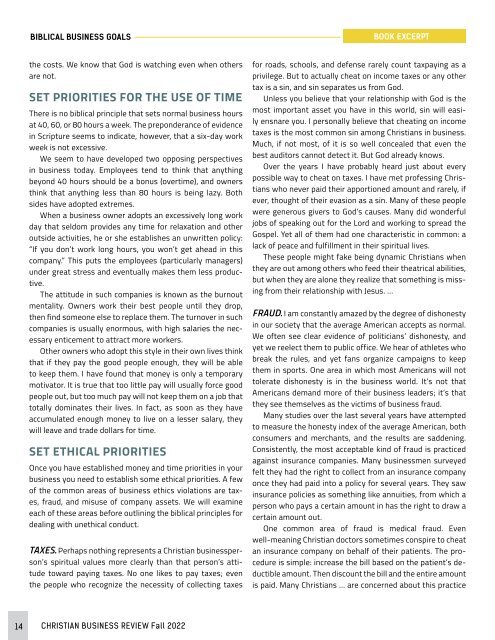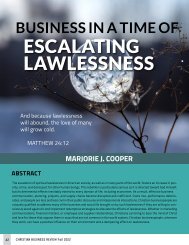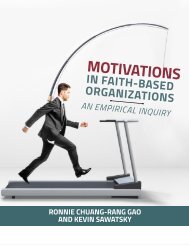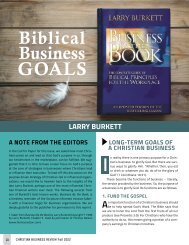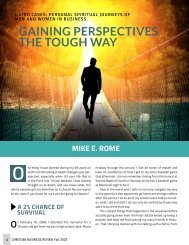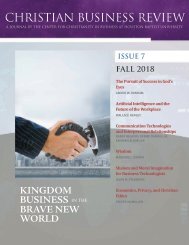Christian Business Review 2022: Pressing On Toward God's Goal
You also want an ePaper? Increase the reach of your titles
YUMPU automatically turns print PDFs into web optimized ePapers that Google loves.
BIBLICAL BUSINESS GOALS<br />
BOOK EXCERPT<br />
the costs. We know that God is watching even when others<br />
are not.<br />
SET PRIORITIES FOR THE USE OF TIME<br />
There is no biblical principle that sets normal business hours<br />
at 40, 60, or 80 hours a week. The preponderance of evidence<br />
in Scripture seems to indicate, however, that a six-day work<br />
week is not excessive.<br />
We seem to have developed two opposing perspectives<br />
in business today. Employees tend to think that anything<br />
beyond 40 hours should be a bonus (overtime), and owners<br />
think that anything less than 80 hours is being lazy. Both<br />
sides have adopted extremes.<br />
When a business owner adopts an excessively long work<br />
day that seldom provides any time for relaxation and other<br />
outside activities, he or she establishes an unwritten policy:<br />
“If you don’t work long hours, you won’t get ahead in this<br />
company.” This puts the employees (particularly managers)<br />
under great stress and eventually makes them less productive.<br />
The attitude in such companies is known as the burnout<br />
mentality. Owners work their best people until they drop,<br />
then find someone else to replace them. The turnover in such<br />
companies is usually enormous, with high salaries the necessary<br />
enticement to attract more workers.<br />
Other owners who adopt this style in their own lives think<br />
that if they pay the good people enough, they will be able<br />
to keep them. I have found that money is only a temporary<br />
motivator. It is true that too little pay will usually force good<br />
people out, but too much pay will not keep them on a job that<br />
totally dominates their lives. In fact, as soon as they have<br />
accumulated enough money to live on a lesser salary, they<br />
will leave and trade dollars for time.<br />
SET ETHICAL PRIORITIES<br />
<strong>On</strong>ce you have established money and time priorities in your<br />
business you need to establish some ethical priorities. A few<br />
of the common areas of business ethics violations are taxes,<br />
fraud, and misuse of company assets. We will examine<br />
each of these areas before outlining the biblical principles for<br />
dealing with unethical conduct.<br />
TAXES. Perhaps nothing represents a <strong>Christian</strong> businessperson’s<br />
spiritual values more clearly than that person’s attitude<br />
toward paying taxes. No one likes to pay taxes; even<br />
the people who recognize the necessity of collecting taxes<br />
for roads, schools, and defense rarely count taxpaying as a<br />
privilege. But to actually cheat on income taxes or any other<br />
tax is a sin, and sin separates us from God.<br />
Unless you believe that your relationship with God is the<br />
most important asset you have in this world, sin will easily<br />
ensnare you. I personally believe that cheating on income<br />
taxes is the most common sin among <strong>Christian</strong>s in business.<br />
Much, if not most, of it is so well concealed that even the<br />
best auditors cannot detect it. But God already knows.<br />
Over the years I have probably heard just about every<br />
possible way to cheat on taxes. I have met professing <strong>Christian</strong>s<br />
who never paid their apportioned amount and rarely, if<br />
ever, thought of their evasion as a sin. Many of these people<br />
were generous givers to God’s causes. Many did wonderful<br />
jobs of speaking out for the Lord and working to spread the<br />
Gospel. Yet all of them had one characteristic in common: a<br />
lack of peace and fulfillment in their spiritual lives.<br />
These people might fake being dynamic <strong>Christian</strong>s when<br />
they are out among others who feed their theatrical abilities,<br />
but when they are alone they realize that something is missing<br />
from their relationship with Jesus. …<br />
FRAUD. I am constantly amazed by the degree of dishonesty<br />
in our society that the average American accepts as normal.<br />
We often see clear evidence of politicians’ dishonesty, and<br />
yet we reelect them to public office. We hear of athletes who<br />
break the rules, and yet fans organize campaigns to keep<br />
them in sports. <strong>On</strong>e area in which most Americans will not<br />
tolerate dishonesty is in the business world. It’s not that<br />
Americans demand more of their business leaders; it’s that<br />
they see themselves as the victims of business fraud.<br />
Many studies over the last several years have attempted<br />
to measure the honesty index of the average American, both<br />
consumers and merchants, and the results are saddening.<br />
Consistently, the most acceptable kind of fraud is practiced<br />
against insurance companies. Many businessmen surveyed<br />
felt they had the right to collect from an insurance company<br />
once they had paid into a policy for several years. They saw<br />
insurance policies as something like annuities, from which a<br />
person who pays a certain amount in has the right to draw a<br />
certain amount out.<br />
<strong>On</strong>e common area of fraud is medical fraud. Even<br />
well-meaning <strong>Christian</strong> doctors sometimes conspire to cheat<br />
an insurance company on behalf of their patients. The procedure<br />
is simple: increase the bill based on the patient’s deductible<br />
amount. Then discount the bill and the entire amount<br />
is paid. Many <strong>Christian</strong>s … are concerned about this practice<br />
14<br />
CHRISTIAN BUSINESS REVIEW Fall <strong>2022</strong>


